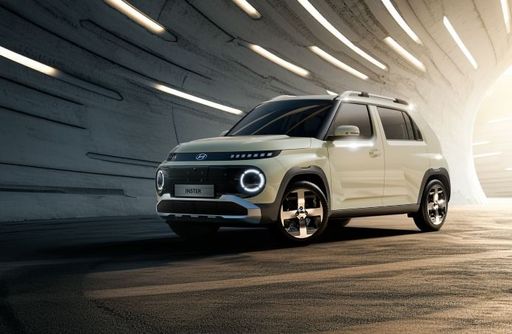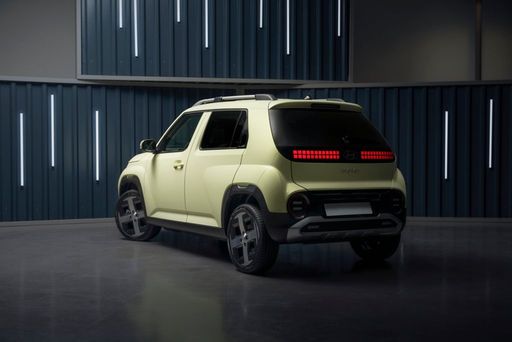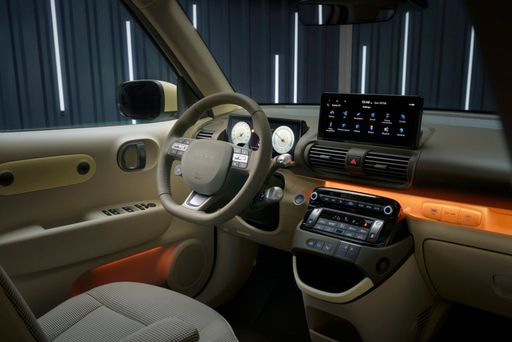Renault Express VS Hyundai Inster – Specs, Efficiency & Price Comparison
Which model is the better choice – the Renault Express or the Hyundai Inster? We compare performance (102 HP vs 115 HP), boot capacity ( vs 280 L), efficiency (4.60 L vs 14.30 kWh), and of course, the price (17100 £ vs 20500 £).
Find out now which car fits your needs better!
The Renault Express (Cargo Van) is powered by a Diesel or Petrol engine and comes with a Manuel transmission. In comparison, the Hyundai Inster (SUV) features a Electric engine and a Automatic gearbox.
When it comes to boot capacity, the Renault Express offers , while the Hyundai Inster provides 280 L – depending on what matters most to you. If you’re looking for more power, you’ll need to decide whether the 102 HP of the Renault Express or the 115 HP of the Hyundai Inster suits your needs better.
There are also differences in efficiency: 4.60 L vs 14.30 kWh. In terms of price, the Renault Express starts at 17100 £, while the Hyundai Inster is available from 20500 £.
Compare all the key specs now and find out which model fits your lifestyle best!
Renault Express
The Renault Express brings a fresh design to the van segment, combining practicality with modern styling cues. Its spacious interior and clever storage solutions make it an ideal choice for both business and leisure purposes. With a focus on comfort and functionality, this vehicle stands out as a versatile option for those in need of reliable transportation.
detailsHyundai Inster
The Inster has quickly captured the attention of automotive enthusiasts with its striking design and dynamic performance. This model seamlessly blends advanced technology with comfort, making it an ideal choice for both daily commutes and adventurous road trips. With its spacious interior and innovative features, the Inster promises an exhilarating driving experience that doesn’t compromise on practicality.
details @ hyundai.news
@ hyundai.news
 @ hyundai.news
@ hyundai.news
 @ hyundai.news
@ hyundai.news

|
|
|
|
|
Costs and Consumption |
|
|---|---|
|
Price
17100 - 19500 £
|
Price
20500 - 25800 £
|
|
Consumption L/100km
4.6 - 6.6 L
|
Consumption L/100km
-
|
|
Consumption kWh/100km
-
|
Consumption kWh/100km
14.3 - 15.1 kWh
|
|
Electric Range
-
|
Electric Range
327 - 370 km
|
|
Battery Capacity
-
|
Battery Capacity
42 - 49 kWh
|
|
co2
121 - 149 g/km
|
co2
0 g/km
|
|
Fuel tank capacity
50 L
|
Fuel tank capacity
-
|
Dimensions and Body |
|
|---|---|
|
Body Type
Cargo Van
|
Body Type
SUV
|
|
Seats
2
|
Seats
4
|
|
Doors
4
|
Doors
5
|
|
Curb weight
1296 - 1390 kg
|
Curb weight
1380 - 1433 kg
|
|
Trunk capacity
-
|
Trunk capacity
238 - 280 L
|
|
Length
4393 mm
|
Length
3825 - 3845 mm
|
|
Width
1775 mm
|
Width
1610 mm
|
|
Height
1811 mm
|
Height
1575 - 1610 mm
|
|
Payload
575 - 700 kg
|
Payload
317 - 357 kg
|
Engine and Performance |
|
|---|---|
|
Engine Type
Diesel, Petrol
|
Engine Type
Electric
|
|
Transmission
Manuel
|
Transmission
Automatic
|
|
Transmission Detail
Manual Gearbox
|
Transmission Detail
-
|
|
Drive Type
Front-Wheel Drive
|
Drive Type
Front-Wheel Drive
|
|
Power HP
75 - 102 HP
|
Power HP
97 - 115 HP
|
|
Acceleration 0-100km/h
11.9 - 16.3 s
|
Acceleration 0-100km/h
10.6 - 11.7 s
|
|
Max Speed
100 - 167 km/h
|
Max Speed
140 - 150 km/h
|
|
Torque
200 - 240 Nm
|
Torque
147 Nm
|
|
Number of Cylinders
4
|
Number of Cylinders
-
|
|
Power kW
55 - 75 kW
|
Power kW
71 - 85 kW
|
|
Engine capacity
1332 - 1461 cm3
|
Engine capacity
-
|
General |
|
|---|---|
|
Model Year
2021
|
Model Year
2025
|
|
CO2 Efficiency Class
D, E
|
CO2 Efficiency Class
A
|
|
Brand
Renault
|
Brand
Hyundai
|
Renault Express
Introduction to the Renault Express
The Renault Express, a compact van from the renowned French manufacturer, continues to make a lasting impression in the versatile light commercial vehicle segment. With its practical design and array of engine configurations, it caters to a wide spectrum of business needs, offering both diesel and petrol variants. As we delve into the details, we'll explore the specifications and innovations that set the Renault Express apart from its competitors.
Efficient Powertrains
The Renault Express boasts a diverse range of engines tailored for efficiency and performance. At the core, it features a selection of both diesel and petrol engines, with outputs ranging from 75 PS to 102 PS. This ensures that operators can select a powertrain that precisely matches their performance requirements and budget constraints.
Whether you opt for the BLUE dCi diesel engine or the TCe petrol variant, the Renault Express promises robust performance combined with impressive fuel economy ranging from 4.6 to 6.6 L/100km. The manual transmission and front-wheel drive configuration further contribute to its efficient operation.
Practicality and Usability
Designed with practicality in mind, the Renault Express excels in usability. With a load capacity ranging from 575 to 700 kg, it provides adequate cargo space for business users. Its compact dimensions—measuring 4,393 mm in length, 1,775 mm in width, and 1,811 mm in height—ensure it remains manoeuvrable even in tight urban environments.
The van’s 50 L fuel tank complements its fuel-efficient nature, minimizing the frequency of refuelling stops and enhancing productivity.
Comfortable and Functional Interior
Inside the Renault Express, a no-nonsense cabin offers comfort and functionality across its two-seat configuration. The straightforward yet ergonomic layout is designed for those who spend significant time on the road. Essential features are included to support the driver, ensuring a pleasant experience even during long journeys.
Safety and Innovation
Renault has not compromised on safety with the Express. With modern safety protocols, the van aims to offer peace of mind to its occupants. Although it's built primarily for utility, the inclusion of essential safety features demonstrates Renault’s commitment to protecting its drivers and cargo.
Innovation is further represented through its environmental considerations, such as the CO2 efficiency class spanning D to E, and emissions ranging from 121 to 149 g/km. This conscientious engineering underscores Renault’s efforts towards a more sustainable future.
Final Thoughts
In conclusion, the Renault Express is a testament to Renault's expertise in crafting efficient, reliable light commercial vehicles. Its blend of power, economy, and practicality makes it a competitive choice for businesses seeking a dependable partner on the road. With a starting price point that remains accessible, the Renault Express continues to deliver exceptional value to its customers, making it a standout in the small van category.
Hyundai Inster
The automotive landscape continues to evolve, and at the forefront of this transformation is the Hyundai Inster, a dynamic model set to impress electric vehicle enthusiasts. As a compact SUV, the Inster embodies a blend of innovative technology, user-friendly features, and an eco-conscious design, making it a contender in the burgeoning electric vehicle market.
Powertrain and Performance
The Hyundai Inster is powered by an efficient electric drivetrain, offering two main battery options: a 42 kWh and a 49 kWh version. These options translate to power outputs of 97 HP and 115 HP, respectively, allowing drivers to choose based on their performance needs. The Inster accelerates from 0 to 100 km/h in 11.7 seconds for the 42 kWh variant, while the more powerful 49 kWh model reaches the same speed in an impressive 10.6 seconds, showcasing Hyundai's commitment to delivering engaging performance.
Range and Efficiency
One of the standout features of the Inster is its electric range. The 42 kWh model provides a range of 327 km, while the 49 kWh variants extend the range to 360 km and 370 km. This remarkable efficiency is complemented by consumption figures of 14.3 kWh/100 km for the 42 kWh variant and 14.9 kWh/100 km for the 49 kWh options. These figures ensure that the Inster is not only suited for city driving but also capable of handling longer journeys with ease.
Dynamic Design and Comfortable Interior
Aesthetically, the Hyundai Inster boasts a sleek and modern look, featuring a compact SUV profile that is both sporty and practical. The dimensions, measuring between 3825 mm and 3845 mm in length, with a width of 1610 mm and heights ranging from 1575 mm to 1610 mm, contribute to its spacious and comfortable cabin. The interior accommodates up to four passengers, making it an ideal choice for small families or couples.
Innovative Features
The Inster incorporates advanced technology geared towards enhancing the driving experience. Its automatic transmission, utilizing a reduction gearbox, ensures seamless gear shifts. Additionally, drivers will appreciate the array of smart features designed for convenience and connectivity, including advanced infotainment systems and driver assistance technologies.
Sustainability Credentials
Hyundai is dedicated to sustainability, and the Inster is a testament to this philosophy. With a carbon footprint of zero emissions, the Inster falls into the A CO2 efficiency class, making it a responsible choice for eco-conscious consumers. The absence of traditional emissions positions the Inster not only as an economical option but also as a proactive step towards reducing our environmental impact.
Conclusion
The Hyundai Inster stands out as a versatile and innovative solution in the electric vehicle segment. With a balanced approach to performance, efficiency, and sustainability, it caters to the modern driver’s needs and reflects the automotive industry's shift towards electrification. The future looks bright for the Inster, as Hyundai continues to pave the way for greener driving experiences.
The prices and data displayed are estimates based on German list prices and may vary by country. This information is not legally binding.
